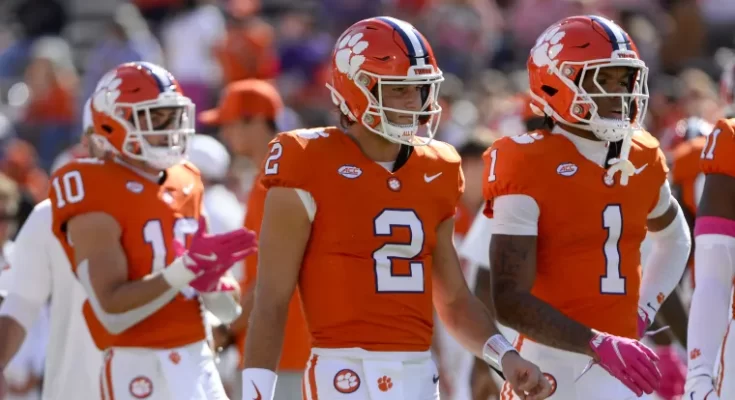How Clemson Became an NFL Talent Factory: A Deep Dive into Their Rising League Presence
During the most recent NFL season, the Clemson Tigers ranked among the top 20 schools with the most active players in the league. This remarkable achievement is more than just a number—it reflects a deeper transformation in the program and a clear shift in how Clemson has developed its players, shaped its culture, and impacted the NFL landscape.
Clemson University has long been respected as a solid football program, but in the past decade, it has evolved into one of the premier talent factories for the NFL. Under head coach Dabo Swinney, the Tigers have not only competed for national titles but have consistently produced high-level athletes ready for the next level. The program’s rise in producing NFL-ready talent isn’t just a happy accident; it’s a result of deliberate planning, elite recruiting, high-level coaching, and a commitment to player development on and off the field.
When NFL teams look to draft prospects, they want players who are physically prepared, mentally tough, and experienced in high-stakes competition. Clemson checks all those boxes. Players come through the program having faced top-tier talent in the ACC and in national championship games. They’re put through NFL-style systems on both sides of the ball and receive coaching that mirrors what they’ll encounter at the next level. This gives Clemson players a smoother transition into professional football, something that general managers and coaches value highly when evaluating college prospects.
Clemson’s approach to developing players is deeply embedded in their system. From the moment a recruit steps onto campus, they’re immersed in a culture that emphasizes preparation and accountability. The facilities rival those of NFL teams. The nutrition program, weight training, recovery protocols, and even the sports psychology staff are all geared toward one goal—maximizing each player’s potential. The commitment to detail ensures that by the time a Clemson player declares for the NFL Draft, they’ve already been operating at or near a professional level.
There’s also something to be said about the caliber of athletes that Clemson attracts. Top high school prospects know that Clemson offers a fast track to the NFL. This creates a self-sustaining cycle—elite recruits see past Clemson players succeed in the league, which makes them more likely to choose the Tigers, which in turn keeps Clemson’s NFL output strong. Quarterbacks like Trevor Lawrence, wide receivers like Tee Higgins and DeAndre Hopkins, and defensive stars like Dexter Lawrence and Christian Wilkins have paved the way. Their NFL success stories are widely known, and they serve as living examples of what a Clemson education and football background can yield.
But it’s not just about the stars. Clemson also develops role players and depth pieces who stick around in the NFL because they’re smart, dependable, and physically ready. Offensive linemen, linebackers, safeties—Clemson produces them all. This balance of star power and roster depth has made the Tigers incredibly appealing to NFL franchises looking to fill out their teams with reliable contributors.
Clemson’s coaching staff deserves significant credit. They’re not just elite recruiters; they’re educators and mentors. Swinney has built a program where assistant coaches stay for multiple years, which creates stability for players. Defensive coordinator Brent Venables, before leaving for a head coaching job, was especially instrumental in developing a defense that was both aggressive and technically sound—something that helped his players make the leap to the NFL with ease. The coaching philosophy focuses on preparing young men for life, not just football, and that broader focus creates individuals who are resilient, adaptable, and coachable—traits highly valued in the league.
The Tigers’ commitment to academics and character development also plays a role. NFL teams don’t just draft based on physical talent—they want individuals who won’t become problems off the field. Clemson emphasizes integrity, leadership, and responsibility. Many of the players who leave the program are considered high-character individuals, making them even more attractive to NFL organizations. When teams are deciding between two equally talented players, the one with the better off-field profile usually gets the nod. Clemson players frequently fit that profile.
Another factor in Clemson’s NFL success is the program’s exposure. The Tigers are constantly in the spotlight, whether it’s on national television, College Football Playoff games, or high-profile bowl matchups. NFL scouts get plenty of opportunities to see Clemson players in action against the best competition. The more often a player is seen, especially under pressure, the easier it is for scouts to evaluate how they’ll fare in the league. Clemson’s frequent presence in these big-time games gives its players an advantage in the evaluation process.
Moreover, Clemson encourages its players to enter the draft only when they’re truly ready. There’s a culture of patience and development that ensures players don’t leave too early. Those who choose to stay get another year of growth and maturity, making them even more appealing to NFL scouts. It’s a model that values the long-term success of the athlete over the short-term gain of the program. This thoughtful approach has helped reduce the number of Clemson players who go undrafted or fail to make NFL rosters after declaring early.
The impact of Clemson’s NFL pipeline also extends back into the program. Former players who’ve made it to the league often return to mentor younger athletes, giving them firsthand insight into what it takes to succeed. This mentorship loop keeps the culture strong and focused. It also reinforces the idea that making it to the NFL is not only possible—it’s expected, as long as the work is put in. That belief system becomes embedded in every player who wears the orange and purple.
From a broader perspective, Clemson’s presence in the NFL raises the school’s national profile. High school recruits are more likely to commit to programs that they believe will set them up for a professional career. The more Clemson players succeed in the league, the more credibility the school gains. This has led to more media coverage, more prime-time games, and even more recruiting advantages. It’s a virtuous cycle that continues to propel the program forward.
What makes Clemson’s rise even more impressive is that they’ve managed to maintain high levels of success without compromising their values. They haven’t had major NCAA violations, scandals, or off-field controversies. The culture is strong and consistent, and that stability is something parents and recruits appreciate. It’s easier for a player to focus and grow in an environment that is built on trust and accountability.
The recent NFL season’s numbers prove that Clemson is not just a good college football program—they’re a legitimate NFL talent hub. When you’re in the top 20 for active players in the league, you’re no longer just feeding the NFL; you’re shaping it. These aren’t just numbers on a spreadsheet—they’re athletes who are contributing on Sundays, making big plays, and representing their alma mater with pride.
It’s worth noting that the evolution of Clemson into this NFL pipeline didn’t happen overnight. It took years of vision, planning, and relentless execution. The administration backed the coaching staff, invested in the facilities, and believed in a long-term strategy that has now paid massive dividends. Fans, alumni, and even rival programs have taken notice. What Clemson has built is nothing short of a model for sustained excellence.
And as the NFL continues to evolve—with faster offenses, more complex defenses, and higher demands on mental and physical preparation—Clemson continues to adapt. The program isn’t resting on its past success. They’re pushing forward with innovation, advanced training techniques, and an ever-growing support system for their student-athletes. The goal isn’t just to make it to the NFL—it’s to thrive there.
In conclusion, Clemson’s place among the top 20 schools with the most active NFL players is both a milestone and a reflection of deeper truths. It shows how far the program has come, how well it prepares its athletes, and how closely its values align with what the NFL demands. The Tigers aren’t just building college champions; they’re creating professionals. And with no signs of slowing down, Clemson looks poised to remain a cornerstone of the NFL pipeline for years to come.



